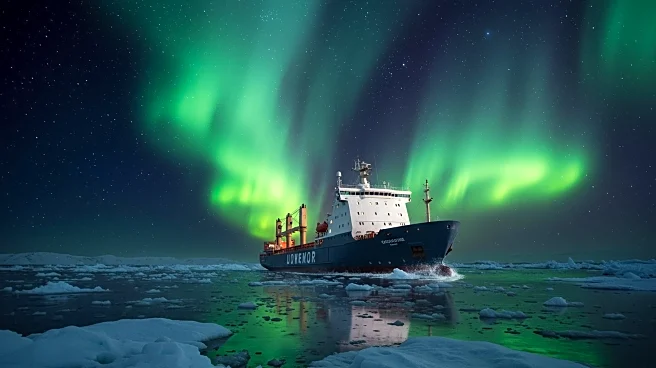What's Happening?
The Chinese container ship Newnew Polar Bear has arrived at the Russian Arctic port of Arkhangelsk, marking the beginning of a busy season for the Northern Sea Route (NSR). Operated by Newnew Shipping, the vessel delivered 497 containers, including auto parts, PVC film, and steel for Russian enterprises. This arrival is part of the expanded Arctic Express N1 service, which connects China's Shanghai and Ningbo ports to Arkhangelsk, offering a shorter shipping route compared to the Suez Canal. Newnew Shipping plans to increase its Arctic service, following successful voyages last year that transported over 20,000 TEU. The company has also announced plans to deploy larger container ships on this route.
Why It's Important?
The expansion of the Arctic shipping route by Newnew Shipping highlights the growing significance of the Northern Sea Route as a viable alternative for global trade. This development is part of a broader Chinese-Russian partnership aimed at enhancing Arctic shipping capabilities. The increased use of this route could lead to reduced shipping times and costs, benefiting industries reliant on international trade. Additionally, the investment in Arkhangelsk port and the planned acquisition of Arc7 ice class container ships indicate a commitment to year-round navigation, potentially transforming Arctic shipping into a major commercial corridor.
What's Next?
Arkhangelsk is expected to receive 20 vessel calls from China through the NSR this year, nearly double the number from last year. Newnew Shipping has secured permits for five of its container ships to transit the NSR this season. The company has also agreed to invest $2.5 billion in expanding Arkhangelsk port, in collaboration with Rosatom, to facilitate year-round navigation. This expansion could lead to increased trade between Russia and China, with timber products from Arkhangelsk being exported to China.
Beyond the Headlines
The use of the Northern Sea Route raises environmental and geopolitical considerations. The Arctic region is sensitive to climate change, and increased shipping activity could impact local ecosystems. Additionally, the collaboration between China and Russia in Arctic shipping may influence geopolitical dynamics, as both countries seek to assert their presence in the region. The investment in ice class container ships underscores the strategic importance of maintaining access to Arctic routes despite challenging conditions.









